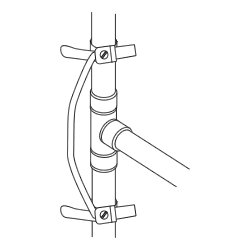The golden rule is : “if you don’t know – ask”.
Plumbing regulations
Water bylaws exist to control work on plumbing installations. If you are unsure about them or indeed what they are, contact your local water board. There are, for example, requirements relating to anti syphon valves being fitted to certain shower installations where the shower head may reach below the top of a bath. Some work must be certified and/or inspected.

Other regulations
It is also necessary to comply with current Building Regulations and the I.E.E (Institute of Electrical Engineers) Wiring Regulations.
The I.E.E Wiring Regulations cover earth bonding of plumbing installations and it is extremely important to follow these.
All metal plumbing must be bonded to earth.
It is very easy for this to be overlooked but its importance can be vital. Imagine, for example, that you have a plumbing emergency and have to replace a section of copper pipe with plastic, or you use a plastic fitting to branch off a supply to a new washing machine. The result would be that a previously continuous earth along the pipe has been broken and part of the pipework no longer bonded. Reinstate the earth continuity by linking an earth wire to a metal earth clamp on each side of the break. The small amount of expense and time could avoid disastrous consequences.
If there is any doubt as to the adequacy of the earthing arrangements, always seek professional advice.
If, for example, you fit a new sink or change a section of pipework, it is vital to ensure that all the plumbing is bonded to earth.
The relevance of the I.E.E. Wiring Regulations does not stop there. There are many instances when an electrical supply is required for the operation of an appliance – Electric shower, waste disposal unit. Follow the Regulations precisely. Since this is a complex document, you may wish to get hold of the ‘Guide’ to the I.E.E. Regulations as well. This document suggests methods for work which will satisfy the Regulations.
If you do not understand or are unsure, always ask for professional help.
To guard against contamination and/or damage to appliances and boilers, new pipe work should be flushed through before connecting to the system. This will overcome the possibility of small amounts of debris remaining in the plumbing installation.
